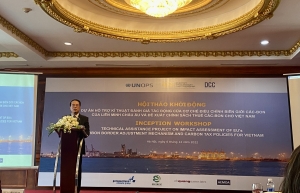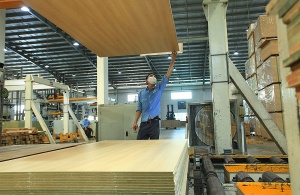Vietnam needs roadmap for carbon neutrality in light of CBAM
 |
Speaking at a workshop on the transition to a greener economy and the role of climate change policies on July 25, Dr. Ha Huy Tuan, dean of Chu Van An University's Economics Faculty, said, "Failure to comprehend the content of theCBAM can result in concerns over exceeding allowable carbon emissions, which can result in increased fees."
"A significant number of businesses, particularly manufacturing firms, do not fully comprehend the EU mechanism since the idea is still relatively novel to the Vietnamese market," Dr. Tuan added.
According to a study conducted by the Private Economic Development Research Board in 2022, just 11 per cent of businesses stated that they comprehended the content of the CBAM, while up to 53 per cent of businesses were unaware of its existence.
According to consultancy firm Dezan Shira & Associates, an additional carbon tax will raise prices of Vietnamese-made products set for the EU, thereby decreasing their competitiveness. CBAM pertains to products from heavy industry and those with the highest carbon emissions.
From October 1, the transition period of CBAM may see reductions in the export turnover of certain Vietnamese products to the EU by approximately $100 million, including iron, steel, cement, aluminium, and fertilisers. The iron and steel industries are expected to be most severely affected.
This reduction should not be detrimental, as the aforementioned commodities account for a small portion of the total quantity of goods exported to the EU. In the future, however, the CBAM is set to be expanded to include a substantial larger number of products that will be subject to an additional carbon fee. This could partially nullify the benefits that Vietnamese businesses receive from the EU-Vietnam Free Trade Agreement.
Furthermore, when the CBAM is implemented, we may see significant markets such as the United States, Japan, and South Korea issue similar policies soon after. Vietnam, a country with a high level of openness, will suffer greatly if it does not take immediate action in response, according to Dezan Shira & Associates.
The EU is developing its strategy to realise its ambition of becoming a climate-neutral continent by 2050. Pham Thi Tinh, commercial director of logistics firm InterLOG's Hanoi Branch, said, apprehensively, "This mechanism imposes taxes. Carbon costs will increase constantly in developed nations, and the number of categories subject to these taxes will be expanded."
As increasing numbers of Vietnamese companies pursue sustainable development, head of Sustainable Development at the British Standards Institution, Truong Vinh Khang, said, "We need to enhance competitive advantages in the supply chain with green strategies that positively impact the environment and reduce our economy's carbon footprint. From there, businesses can develop their own carbon-neutral roadmap."
 | Impact assessment of EU’s Carbon Border Adjustment Mechanism begins A project on the impact assessment of the EU’s Carbon Border Adjustment Mechanism (CBAM) and recommendations on carbon tax policies for Vietnam officially kicked off this month. |
 | Apprehension apparent over fresh CBAM regulations The EU’s Carbon Border Adjustment Mechanism could help Vietnam set up a carbon market, so long as taxes are used to balance economic growth and emissions. |
What the stars mean:
★ Poor ★ ★ Promising ★★★ Good ★★★★ Very good ★★★★★ Exceptional
Related Contents
Latest News
More News
- $100 million initiative launched to protect forests and boost rural incomes (January 30, 2026 | 15:18)
- Trung Nam-Sideros River consortium wins bid for LNG venture (January 30, 2026 | 11:16)
- Vietnam moves towards market-based fuel management with E10 rollout (January 30, 2026 | 11:10)
- Envision Energy, REE Group partner on 128MW wind projects (January 30, 2026 | 10:58)
- Vingroup consults on carbon credits for electric vehicle charging network (January 28, 2026 | 11:04)
- Bac Ai Pumped Storage Hydropower Plant to enter peak construction phase (January 27, 2026 | 08:00)
- ASEAN could scale up sustainable aviation fuel by 2050 (January 24, 2026 | 10:19)
- 64,000 hectares of sea allocated for offshore wind surveys (January 22, 2026 | 20:23)
- EVN secures financing for Quang Trach II LNG power plant (January 17, 2026 | 15:55)
- PC1 teams up with DENZAI on regional wind projects (January 16, 2026 | 21:18)

 Tag:
Tag:




















 Mobile Version
Mobile Version